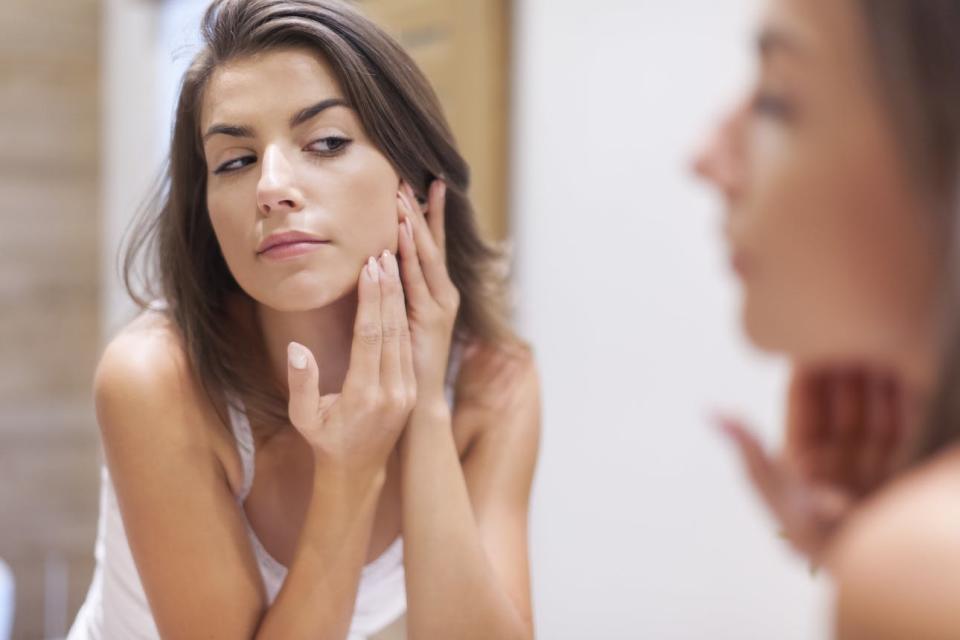7 Things Your Skin Is Trying to Tell You About Your Health
You’ve probably heard it said that the skin is the largest organ in the body. While there’s debate surrounding whether this is scientifically accurate, there’s no doubt about the connection between your skin and your overall health. The average adult carries around eight pounds of skin spread over 22 square feet, and, biggest organ or not, skin takes up a lot of space on our bodies for a reason — every square inch plays a surprisingly significant role in our well-being. In addition to shielding us from harmful elements, bacteria, and chemicals, the skin also regulates our body temperatures, stores fat and water, and picks up sensory information from the outside world, sending important messages to our brain. Through exposing our skin to sunlight, the body also produces vitamin D, which is crucial to bone health.

On top of protecting us from the outside world, skin can also act as a window into what’s happening on the inside of our bodies. Take rashes, for example: If you eat something and break out in hives, your skin is sending you a message that your body is having an allergic reaction. Same goes for issues like acne or dry skin — while these common skin conditions are certainly pesky, sometimes they can point you to a deeper, systemic issue. Curious what the state of your skin is saying about the state of your overall health? Read on for a few ideas of what your skin might be telling you — and be sure to chat with your doctor if you have any concerns.
1. Your diet needs adjusting. Nutrition and skin have a very close relationship. What you put in your body – and how your body absorbs it — can alter your skin’s structure and function and directly affect its appearance, according to Oregon State University. From nutritional deficiencies to too much of a good thing, here are just a few of the ways your diet can affect your skin:
If your skin is excessively dry, you may be low in vitamin A.
If your skin is discolored and your wounds don’t heal normally, you may be deficient in vitamin C.
If you’re experiencing signs of premature aging, you may be eating too much processed food or refined sugar or foods low in antioxidants.
If you struggle with acne or oily skin, you may need to cut down on overly fatty foods or carbs — though the verdict is still out on the relationship between greasy foods and acne.

2. You’re dehydrated. Whether you live in a cold, dry climate or dry skin runs in your family, there’s nothing fun about patchy, flaky skin. But there may be another culprit at play when it comes to chronic dryness: Dehydration. While there’s no real scientific evidence that drinking extra water can make skin glow, if the epidermis — the outer layer of skin — doesn’t contain enough water, it’ll likely appear rough and lack elasticity.
3. Your hormones are out of whack. If your acne is out of control and nothing’s helping, excess hormones, like androgens, could be to blame. Androgens, which first rise during puberty, cause oil glands to enlarge, leading to more sebum production and potentially an acne flare-up. Hormonal fluctuations in pregnancy or with the use of birth control can also increase acne, according to the Mayo Clinic.
4. You need some serious shut-eye. Chronically puffy eyes and dark circles? Chances are you would benefit from some extra sleep. But keep in mind that chronic exhaustion is also linked to increased stress, poor nutritional choices, and excess caffeine consumption — all of which can affect skin health.

5. You have an allergy or food sensitivity. If you have an unexplained rash or you spontaneously break out into hives after exposure to a certain food, you may want to look into allergies. Many food allergies or sensitivities trigger an immune response that can result in skin issues (most commonly rashes or hives). For example, celiac disease frequently causes an itchy, blistery rash.
6. It’s time for some sunscreen. While some time in the sun can promote health through the production of vitamin D in your skin, too much time outdoors without ample sunscreen — not to mention tanning — can lead to sun damage from skin thickening, discoloration, premature signs of aging, and even skin cancer. Dermatologists recommend using SPF-30+ sunscreen anytime you’ll be outside (yes, even in winter).
7. You need to de-stress ASAP. A lifestyle of stress can wreak havoc on our bodies, inside and out, and the skin is no exception. That’s because there’s a profound relationship between the nervous system and the skin. Studies link chronic stress to inflammatory skin conditions like acne, psoriasis, eczema, or rosacea, and some scientists hypothesize that stress combined with UV exposure can increase the risk of skin cancer.
If you’re concerned about a skin condition or another health issue, make sure to consult with your doctor as soon as possible.
Tweet us what you think your skin is telling you @BritandCo.
(Photos via Getty)


